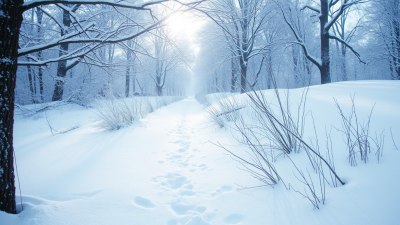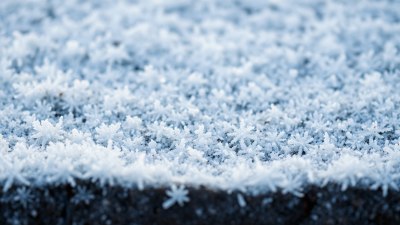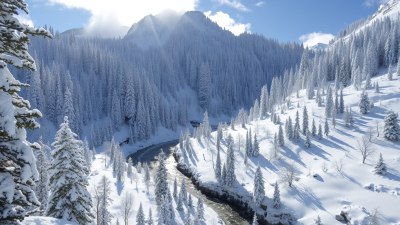Why Silence in Winter Feels Like Atmospheric Pressure
Explore the unique relationship between winter silence and atmospheric pressure, revealing how cold air shapes our sensory experience.

Winter has an uncanny ability to transform the world around us into a realm of profound silence. This quietness is not only a result of fewer sounds but also an intricate interplay of environmental factors that affect how we perceive the atmosphere itself. Among these factors, atmospheric pressure plays a subtle yet significant role in shaping the sensations we associate with winter silence. In this article, we will delve into the science behind why silence in winter often feels like a tangible form of atmospheric pressure.
Understanding Atmospheric Pressure
Atmospheric pressure, often referred to as barometric pressure, is the force exerted by the weight of air molecules pressing down on Earth's surface. It is measured in units like millibars or inches of mercury and fluctuates due to weather patterns, temperature changes, and altitude. High-pressure systems typically bring clear, calm weather, while low-pressure systems are often associated with storms and clouds.
These pressure differences influence not just weather but also various physiological and psychological effects on humans. For example, high-pressure systems can lead to feelings of calmness and clarity, whereas rapidly dropping pressure might cause headaches or irritability in sensitive individuals. Understanding this sets the stage for appreciating how winter's atmospheric characteristics impact our sensory experience of silence.
Winter's Atmospheric Conditions and Pressure
Winter air tends to be colder and denser compared to other seasons. Cold air compresses more tightly, which can lead to higher surface atmospheric pressure in several regions. This compression results in what meteorologists classify as a high-pressure system during winter months.
High-pressure systems in winter are often accompanied by clear skies and calm winds. The absence of strong air movement reduces the number of ambient sounds such as rustling leaves or distant traffic noise. This creates a stillness that seems almost palpable, intensifying our perception of silence.
How Silence Feels Like Pressure
The sensation of silence during winter is not merely an absence of sound but can feel like a physical presence, akin to atmospheric pressure pressing upon us. One explanation lies in how our auditory system functions in cold environments. Lower temperatures can reduce the activity of biological processes, including those in the ear and brain responsible for interpreting sound, subtly altering our perception.
Moreover, the increased density of cold air affects sound propagation. Sound waves travel faster but do so with less energy loss in cold air, potentially making noises seem sharper when they occur. When those noises are infrequent due to winter's stillness, the contrast creates a sensory vacuum, where silence dominates so heavily it feels like a force.
This heavy silence can be experienced similarly to the reflexive awareness we have of atmospheric pressure on the skin and sinuses. Our bodies detect subtle changes in pressure around us, and this combined with the sensory deprivation of sound leads to the impression that silence itself carries weight.
Psychological Impact of Winter Silence
Silence in winter also influences mood and cognition. For many, the quiet cloak of a snowy landscape induces calmness and introspection. The reduction in ambient noise allows the mind to focus, sometimes leading to enhanced creativity or peaceful meditation.
However, the same silence can feel oppressive or heavy, especially in long winters where the lack of stimulation may lead to feelings of isolation or melancholy. This ambivalence contributes to why silence feels like a tangible presence—sometimes comforting, other times burdensome.
Environmental Factors Enhancing the Sensation
Additional environmental elements during winter amplify the sensation of atmospheric pressure linked with silence. Snow cover, for instance, acts as a natural sound barrier, absorbing and dampening noise much more effectively than bare ground. This muffling further reduces auditory input, making the stillness more pronounced.
Wind chill also plays a role. When cold air moves, it can intensify the feelings of pressure on exposed skin, reminding us physically of the atmosphere's force. In contrast, calm winds under a high-pressure system permit silent, frozen environments where atmospheric pressure remains but without the tactile reminders of wind.
Physiological Responses to Pressure and Silence
Human physiology is finely attuned to changes in atmospheric pressure. Ears adjust to pressure differences, often causing sensations of fullness or discomfort. Similarly, in cold, high-pressure winter conditions, the body experiences changes in blood circulation and metabolic rate, which affect how sensory inputs are processed.
The combination of sensory deprivation from silence and physiological awareness of pressure can heighten alertness to subtle environmental cues. Our body language and breathing might change unconsciously, mirroring the quiet intensity of the surrounding atmosphere.
Cultural Associations With Winter Silence and Pressure
Across cultures, winter silence has inspired artistic expressions and symbolic meanings. Some traditions view the quiet of winter as a time of rest and renewal, embracing the stillness as a necessary pause. Others interpret it as a metaphor for introspection or even existential pressure.
These cultural lenses influence how individuals perceive the atmospheric pressure-related silence. The blend of environmental reality and psychological interpretation shapes a deeply personal and often profound sensory experience.
Scientific Studies on Winter Atmosphere and Perception
Research in environmental psychology and atmospheric science has investigated how weather and pressure affect human perception. Studies show correlations between high-pressure weather and increased reports of calmness but also heightened awareness of internal bodily sensations.
Experiments involving sound perception in varying temperatures confirm that colder air affects sound speed and attenuation, which modifies auditory experiences. These findings support the idea that winter's atmospheric conditions contribute directly to the weighty sensation of silence.
Practical Implications and Applications
Understanding the connection between winter silence and atmospheric pressure has practical uses. In architecture and urban planning, designs that consider sound insulation and airflow can recreate or mitigate these sensations to enhance comfort.
In mental health, recognizing how environmental factors influence mood and perception helps develop therapeutic strategies for seasonal affective disorder and stress management by using winter silence constructively rather than viewing it as oppressive.
Experiencing Winter Silence Mindfully
To appreciate the phenomenon, one can engage in mindful observation of winter environments. Noticing the quiet, the crispness of the air, and the sensations upon the skin fosters a deeper connection to nature's physical laws. Meditation or slow walks during winter allow one to experience the atmospheric pressure and silence as a unified sensory event.
This practice can shift the perception from silence being an empty void to recognizing it as a rich atmospheric presence that shapes our experience of place and time.
Conclusion Without Using Heading Tags
In sum, the silence felt during winter months is imbued with the qualities of atmospheric pressure due to a complex interaction of cold, dense air, high-pressure systems, and environmental factors that dampen sound and focus sensory awareness. This creates a profound sensory fusion in which silence is not simply a lack of noise but a physical sensation, sometimes comforting, sometimes intense.
Recognizing this phenomenon enriches our understanding of how deeply environment influences perception and how winter's stillness can be appreciated as a subtle yet powerful force shaping our daily experience.











